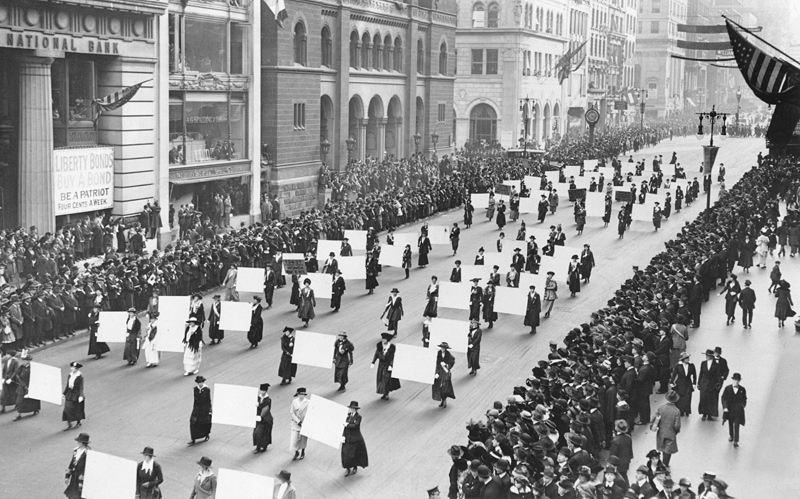
More Info
Women suffragists march down Fifth Avenue in October 1917. Advocates display placards containing the signatures of more than one million New York women demanding the vote.
Photo credit: The New York Times archive
Opposition to 19th Amendment relied on false narratives
This week marks the 100th anniversary of the ratification of the 19th Amendment to the U.S. Constitution, which gave women the right to vote. It took the women’s suffrage movement decades to achieve that goal, thanks to entrenched discrimination that severely restricted women’s lives.
Opposition to women’s suffrage relied on false narratives that seem particularly outrageous, and sometimes comical, even for that era. For example, an Atlantic magazine article Why Men Thought Women Weren’t Made to Vote noted the common theory that the mental effort of voting could make women infertile. In addition, mainstream science also deemed women’s brains to be unfit. “And if women overexerted their already inferior brains, the thinking went, their health could suffer,” the article explains.
Brutality and discrimination
Yet, the supposedly fragile nature of women did not prevent authorities from treating suffragists with brutality. Consider the 1917 arrests and imprisonment of nearly three dozen women picketing outside the White House. Their jailers gave them maggot-infested food, beat the women and force-fed those who went on a hunger strike. The D.C. Court of Appeals ruled the arrests unlawful, and freed the women.
While the 19th Amendment extended the vote to all women, in reality, black women (and for a time, Native American women) could not broadly exercise that right. Discriminatory laws in the South kept many Blacks — women and men — from the polls until the passage of the Voting Rights Act in 1965. The voter suppression tactics targeted at people of color also were based on false narratives.
False narratives persist
However, while these events and the opposition to the right to vote might sound like relics of an ancient civilization, it’s important to remember that false narratives persist. Such tactics can boost efforts to deny people their rights as citizens and denigrate segments of our population. In modern elections, false narratives raise false alarms about voter fraud and sow distrust of widely accepted voting methods.
Remember, news literacy is essential to being well-informed about how government works and to recognizing false narratives. Use your news literacy skills and knowledge during this election season to avoid misinformation — and to help others do the same.
